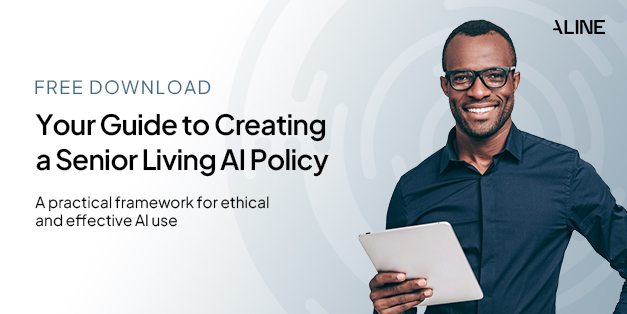AI Policy in Senior Living: A 2025 Guide [Free Template]
Protect your senior living community with an AI policy in senior living. Learn how to write your own and download our free template.

Protect your senior living community with an AI policy in senior living. Learn how to write your own and download our free template.
Published on: March 27, 2025
Last updated: June 24, 2025

According to a recent survey from LifeLoop, fewer than 10% of senior living providers currently use AI, but more than a third plan to adopt it in the future, establishing AI as a senior living trend to watch. Whether you’re a new adoptee or are already using AI as part of your operations management, you need an AI policy in senior living to protect you and your team.
We’ve heard from our customers at recent senior living events that you aren’t sure where to start when it comes to adopting AI in your senior living community. As one of the industry’s leaders in senior living AI, we’ve assembled everything you need to know about introducing this technology to your business, starting with creating an AI policy.
Read on to learn more about this key document and download our free AI policy in senior living template.
An AI policy is a comprehensive framework for responsible, ethical, and strategic implementation of AI technology for senior living organizations. A well-crafted AI policy reassures your employees and stakeholders use AI appropriately.
An AI policy seeks to:
If you don’t have an AI policy in place, you could be vulnerable to ethical, reputational, and legal issues.
AI systems in senior living collect and process sensitive personal information about residents. This data includes medical information, such as conditions and medication, as well as billing and insurance information, such as Social Security numbers and banking information. A robust AI policy ensures your team handles data ethically and securely while complying with relevant data privacy regulations.
As a senior living provider, your job is to protect your residents. AI can help you identify and address risks but can and does make mistakes.
A properly written AI policy guides appropriate usage to prevent those mistakes and unintended consequences. Using our earlier example, an AI policy might require your care team to review AI care recommendations before implementing them and allow caregivers to override those recommendations if a resident’s medical and care knowledge warrants it.
Your residents and their families want to know they are well cared for, but AI tools may seem scary and conjure images of dystopian movies where robots replace nurses. An AI policy establishes trust with residents and their families by sharing your AI usage and accountability practices upfront.
As AI continues to develop rapidly, so do regulations regarding data privacy and industry standards. An AI policy can help ensure your team complies with current and future regulations.
Despite your best efforts, someone on your team may use AI irresponsibly. The presence of a well-written AI policy allows you to take action without concerns that the employee may retaliate and claim they weren’t aware the way they used AI was irresponsible.
When drafting your community’s AI policy, addressing the following considerations is important.
Fairness, transparency, accountability, and privacy are the cornerstones of ethical AI use. Ensure AI serves residents’ best interests while protecting human dignity and respect.
Your policy must outline the following:
To prevent unfair treatment, discriminatory decision-making, or overlooked needs, your AI policy should include references to:
AI is powerful, but human judgment is irreplaceable, especially in senior living care. Your AI policy must:
Your staff and residents should be aware of any AI being used, and any explanations should be easily understandable. Include these elements:
Don’t simply write an AI policy and then keep it hidden in a drawer. Your AI policy is a living document that adapts to enhanced technologies, responds to changing regulatory landscapes, and improves based on staff and resident feedback.
Outline how you plan to regularly assess the effectiveness of your AI strategy.
How will you maintain trust and personal autonomy in your AI usage? Your policy must outline a plan to:
Your staff must be trained on how to use AI effectively. Create an AI policy that:
Follow the steps below to create a robust AI policy for your senior living community.
If you aren’t sure where to start, use our free AI Policy in Senior Living template. Update the copy to reflect your community, and we recommend running it by your legal team as well.

The future of senior living undoubtedly includes AI, and senior living providers must be ready. Aline is at the forefront of AI in senior living, with the largest senior living dataset on the market. Book a demo today to see how Aline Intelligence can help improve your operations while providing better quality care.

Amanda McGrory-Dixon
Amanda McGrory-Dixon is the content marketing manager at Aline, where she shares expert insights on how senior living communities can streamline operations, enhance resident satisfaction, and drive sustainable growth. With a deep understanding of industry trends and technology, she helps operators navigate challenges and implement data-driven strategies to improve efficiency, profitability, and care outcomes.
Blogs, stories and studies from the forefront of senior living operations

Lead generation surveys give senior living operators the data they need to understand their market, uncover new opportunities, and drive occupancy growth.

Prospect-centered selling helps senior living operators convert more leads and achieve occupancy goals through a more personalized, empathetic approach.

Gain insight into senior living pricing strategies for community success. Explore how Aline’s software optimizes revenue and operations

Overcome the biggest senior living financial challenges, including operational costs and occupancy rates, with interconnected software

Take a look at how senior living software options, like Aline, can elevate operations, resident care, and ROI

Enhance efficiency, accuracy, and resident satisfaction by integrating a POS system into your senior living dining operations
We’re using cookies on this site to improve your experience. Cookies help us learn how you interact with our website, and remember you when you come back so we can tailor it to your interests.
You can find out more about cookies and usage on our cookie policy page.
Some of these cookies are essential, while others help us to improve your experience by providing insights into how the site is being used.
For more detailed information on the cookies we use, please check our privacy policy
Your experience is important to us. We’re redirecting you to our new Aline website, where you’ll discover how our complete suite of senior living solutions can help you grow occupancy and revenue, optimize operations, and enhance resident care.
For more information, you’re welcome to read our statement on our merger. To continue your web experience, simply close this notification.
Your experience is important to us. We’re redirecting you to our new Aline website, where you’ll discover how our complete suite of senior living solutions can help you grow occupancy and revenue, optimize operations, and enhance resident care.
For more information, you’re welcome to read our statement on our merger. To continue your web experience, simply close this notification.
Your experience is important to us. We’re redirecting you to our new Aline website, where you’ll discover how our complete suite of senior living solutions can help you grow occupancy and revenue, optimize operations, and enhance resident care.
For more information, you’re welcome to read our statement on our merger. To continue your web experience, simply close this notification.
Your experience is important to us. We’re redirecting you to our new Aline website, where you’ll discover how our complete suite of senior living solutions can help you grow occupancy and revenue, optimize operations, and enhance resident care.
For more information, you’re welcome to read our statement on our merger. To continue your web experience, simply close this notification.
Aline Innovation Summit 2026: Registration Now Open!
Connect with senior living leaders, innovators, and industry peers May 11-13, 2026, in Frisco, TX to explore the latest innovations, proven strategies, and best practices shaping the future of senior living. View details and register today.